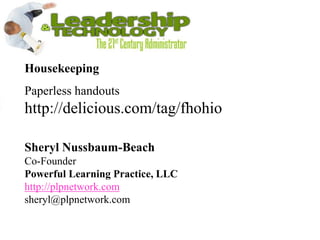
Fh
- 1. Housekeeping Paperless handouts http://delicious.com/tag/fhohio Sheryl Nussbaum-BeachCo-Founder Powerful Learning Practice, LLChttp://plpnetwork.comsheryl@plpnetwork.com
- 2. How will education be different tomorrow because of our meeting today? How will you contextualize and mobilize what you learn? How will you leverage, how will you enable your faculty to leverage- collective intelligence?
- 3. Principle of the Path “Direction-not intention-determines our destination.” Andy Stanley Are your daily choices as a 21st Century Administrator taking you and your school in the direction you want to go?
- 4. What’s Changed? Last fall you gave us these barriers– what have you overcome? How will you overcome? http://docs.google.com/Doc?docid=0AQG4xdEX3Qe4ZGdnemh3ODVfNDlkN3hnbW1oZA&hl=en
- 5. Powerful Conversation Using Self-Eval Rubric http://docs.google.com/View?id=ah8n38hnwpnq_620dq9ffsfm
- 7. United States Is Substantially Behind Other Nations in Providing Teacher Professional Development That Improves Student Learning; Report Identifies Practices that WorkResearch shows that professional learning can have a powerful effect on teacher skills and knowledge and on student learning. To be effective, however, it must be sustained, focused on important content, and embedded in the work of collaborative professional learning teams that support ongoing improvements in teachers’ practice and student achievement. “Teachers lack time and opportunities to view each other’s classrooms, learn from mentors, and work collaboratively,” says Gov. James B. Hunt, Jr., the former four-time governor of North Carolina.
- 10. New Media Literacies- What are they?http://newmedialiteracies.org/ Will the future of education include broad-based, global reflection and inquiry? Will your current level of new media literacy skills allow you to take part in leading learning through these mediums? What place does emerging media have in your role as a change savvy leader?
- 11. Community is the New Professional Development Cochran-Smith and Lytle (1999a) describe three ways of knowing and constructing knowledge that align closely with PLP's philosophy and are worth mentioning here. Knowledge for Practice is often reflected in traditional PD efforts when a trainer shares with teachers information produced by educational researchers. This knowledge presumes a commonly accepted degree of correctness about what is being shared. The learner is typically passive in this kind of "sit and get" experience. This kind of knowledge is difficult for teachers to transfer to classrooms without support and follow through. After a workshop, much of what was useful gets lost in the daily grind, pressures and isolation of teaching. Knowledge in Practice recognizes the importance of teacher experience and practical knowledge in improving classroom practice. As a teacher tests out new strategies and assimilates them into teaching routines they construct knowledge in practice. They learn by doing. This knowledge is strengthened when teachers reflect and share with one another lessons learned during specific teaching sessions and describe the tacit knowledge embedded in their experiences.
- 12. Community is the New Professional Development Knowledge of Practice believes that systematic inquiry where teachers create knowledge as they focus on raising questions about and systematically studying their own classroom teaching practices collaboratively, allows educators to construct knowledge of practice in ways that move beyond the basics of classroom practice to a more systemic view of learning. I believe that by attending to the development of knowledge for, in and of practice, we can enhance professional growth that leads to real change. Cochran-Smith, M., & Lytle, S.L. (1999a). Relationships of knowledge and practice: Teaching learning in communities. Review of Research in Education, 24, 249-305.
- 13. What does it mean to work in a participatory 2.0 world?
- 14. PD of the 21st Century will be—teacher directed through: Connections (PLNs, PLCs & CoP)
- 15. Personal Learning Networks FOCUS: Individual, Connecting to Learning Objects, Resources and People – Social Network Driven
- 16. Communities Building capacity in both individuals and groups Self efficacy and collective efficacy Global citizenship within a local context
- 17. Professional Learning Communities The driving engine of the collaborative culture of a PLC is the team. They work together in an ongoing effort to discover best practices and to expand their professional expertise. PLCs are our best hope for reculturing schools. We want to focus on shifting from a culture of teacher isolation to a culture of deep and meaningful collaboration. FOCUS: Local , F2F, Job-embedded- in Real Time
- 18. Communities of Practice FOCUS: Situated, Synchronous, Asynchronous- Online and Walled Garden
- 19. “Some online communities emerge out of nowhere, are totally unplanned and blossom. But these are the minority. There is a good deal of evidence to suggest that careful planning is essential to the success of an online community” (Australian Flexible Learning Framework, What are the characteristics of effective online learning communities? pg 7, 2003)
- 20. Examples of Community Driven Collaboration - Action Research - Distributive Leadership
